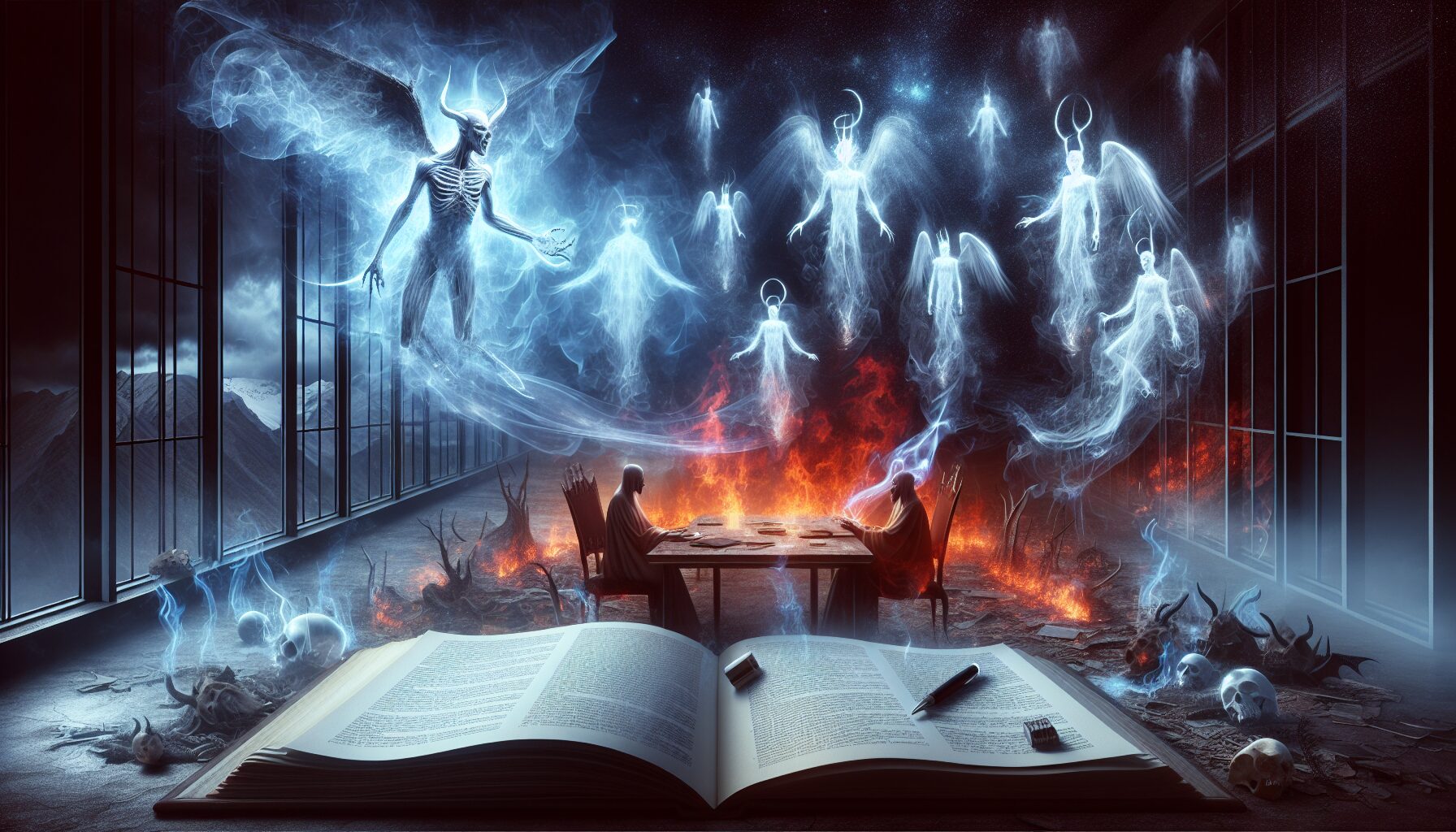The concept of demons and their infamous contracts has pervaded human consciousness for centuries. As we delve into the metaphoric and literal truths behind these pacts, we uncover tales and beliefs etched in the framework of our collective psyche.
The Evolution of Demonic Contracts
The idea of making a deal with the devil is ingrained in many cultures. Traditionally, these contracts promise worldly success in exchange for something far more precious—the human soul. One of the earliest known stories is that of Faust, the legendary scholar who made a pact with Mephistopheles.
According to Marlowe’s version in The Tragical History of Doctor Faustus, Faustus, restless in his intellectual ambition, exchanges his soul for infinite knowledge and worldly pleasures. This story has been retold numerous times, including Goethe’s classical retelling, each version reflecting the moral and philosophical dilemmas of its time. As Marlowe writes:
“Hell hath no limits, nor is circumscrib’d
In one self place; but where we are is hell,
And where hell is, there must we ever be.”
Demons as Cultural Archetypes
In modern consciousness, demons have transformed into archetypal figures representing human desires and the moral struggles inherent in fulfilling them. They are less about literal evil and more symbolic of the complex duality within the human spirit.
- Temptation and Power: Demons often embody the temptation to pursue personal gain without considering consequences. Characters in literature, such as Faust, or modern TV shows like Supernatural, reenact these eternal struggles.
- Internal Conflicts: The demon becomes a metaphor for our internal battles. As psychiatrist Dr. Carl Jung suggests, “Knowing your own darkness is the best method for dealing with the darknesses of other people.”
Modern Interpretations in Pop Culture
Contemporary media often revives these themes, exploring more nuanced portrayals of demonic contracts. Shows like Lucifer humanize demons, often presenting their characteristics and actions as reflections of human conditions rather than absolute moral vileness.
In Neil Gaiman’s The Sandman series, for instance, demons are interwoven into emotionally complex narratives, presenting their pacts as rich story elements rather than one-dimensional tropes. Gaiman once stated, “I think of myths as something that reflects our lives, and fairy tales as something that offers us tools to deal with them.” This viewpoint captures the transformative power of demonic stories when applied as metaphors for real-world challenges.
Psychological Dimensions of Infernal Deals
Psychoanalytically, these contracts can be seen as manifestations of the human psyche’s shadow side. This darkest aspect yearns for the forbidden fruit, the indulgence of power and pleasure unchecked by morality. Contemporary psychology often uses terms like “shadow work” to encourage individuals to confront and understand these buried inclinations.
Famed psychologist Sigmund Freud observed that often our most denied desires manifest symbolically in dreams and narratives, such as the classic demonic bargains. Quoting Freud, “Unexpressed emotions will never die. They are buried alive and will come forth later in uglier ways.” This aligns well with how literature and films explore demonic contracts, symbolizing repression and subsequent realization.
Legal and Social Contracts as Modern Analogies
Interestingly, the concept of demonic contracts shares metaphoric parallels with some modern legal and social contracts. The intricate dance between gaining and losing, taking risks in ethical dilemmas, poses questions relevant in business and personal relationships today.
- Corporate Agreements: In business, the idea of signing a binding agreement can feel Faustian. Is one risking integrity for profit? Thankfully, unlike soul-binding infernal deeds, legal contracts allow for negotiation and revision.
- Personal Sacrifices: Consider personal contracts in social settings—the compromises and allegiances individuals make with societal norms can often feel like a metaphorical deal with the devil, sacrificing self-identity for acceptance.
The Enduring Allure of Demonic Contracts
The fascination with infernal pacts endures because they pose questions integral to self-reflection and caution. What are we willing to risk for our deepest desires? How do we reconcile ambition with morality?
Writer Joseph Campbell succinctly proposed in The Power of Myth, “Myths are public dreams; dreams are private myths.” Within this framework, demonic contracts become the mythic expression of personal ambition and fear, dreams that test the boundaries of morality and consequence.
As individuals and societies continue to evolve, so too will the interpretation and representation of these infernal bargains. Whether perceived as ancient folklore or modern parable, the story of the human soul’s commerce with demonic forces remains, drawing us into its depths with every retelling.
In conclusion, demonic contracts serve as potent metaphors for many of the predicaments humans encounter—whether ethical, emotional, or societal. They remind us of the continual balance we seek between our noblest aspirations and base desires.
To understand demons in modern consciousness is to understand a critical part of the human experience, forever complex, entirely personal, and yet universally resonant.
